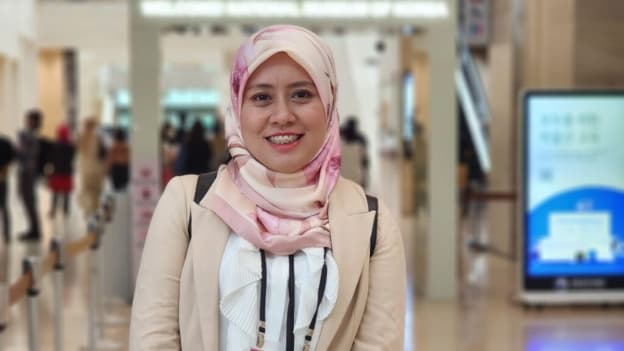How AI empowers the women of Southeast Asia

At the tender age of one, Jidapa Nitiwirakun’s family noticed she hadn’t yet learnt how to walk the way most children her age would. She was later diagnosed with muscular dystrophy.
Because of the condition, Jidapa’s muscle strength continued to weaken every year, but she didn’t let it keep her from getting far in life.
When she reached the age of 21, the Pattaya, Thailand native was able to secure jobs that allowed her career to blossom.
Just last year, Jidapa joined Toyota Tsusho’s Thai headquarters, located in the coastal province of Chonburi, miles away from her hometown. There, she lived independently, pushing through life despite her highly limiting condition.
Getting far in life
Jidapa’s career at Toyota Tsusho began when she studied at the Pattaya Redemptorist Technological College for People with Disabilities as part of Microsoft’s Skills for Jobs program. She learnt PowerPoint, artificial intelligence, coding, and Power BI.
It was during that time when representatives from Toyota Tsusho’s trading arm in Thailand visited the facility and saw her work. It led to a full-time job.
Today, Jidapa drives a mechanised wheelchair as she goes about her work. She’s currently focused on tracking her company’s carbon footprint using Power BI, while also doing design work for internal communications using Dall-E and other Microsoft AI tools.
“I am very proud of myself that I can financially support my family,” she said in an interview with Microsoft.
AI is accelerating the demand for digital skills in the workplace. According to Microsoft's Work Trend Index, 90% of Southeast Asian leaders believe their employees need upskilling to thrive in an AI-driven future.
Responding to this need, Microsoft aims to equip 2.5 million people in the ASEAN region with AI skills by 2025. The initiative, in partnership with various sectors, builds upon existing programs that have successfully boosted careers, especially for women in tech.
Where passion and innovation lead
Meanwhile, Hasyiya Karimah Adli – a 37-year-old chemist with a PhD under her belt – has also benefitted from several AI-focused learning programs. She was one of the beneficiaries of Microsoft’s Code; Without Barriers program where she learned about AI and the Internet of Things.
Through hard work, Aldi was able to transition from being a chemist to being the founding dean of Data Science and Computing at the University Malaya Kelantan in Malaysia.
“I keep telling them I also am not from IT… [but] if they have passion, there is no need to doubt themselves,” she said.
A digital lifeline in difficult times
In Mojokerto, East Java, Shelin Puspa Arum’s parents faced a dire situation as their bakso stall nearly succumbed to COVID-19 lockdowns. Determined to help, the university student discovered a lifeline in Microsoft’s Skills for Jobs initiative.
Through free digital training, Shelin mastered Excel, Word, PowerPoint, and data analysis, and secured a job as a quality control officer. Now aged 25 and in her final year of majoring in history, she balances full-time work with her studies.
Leveraging Excel for quality control data analysis, Shelin seamlessly integrates tables into Word reports. When a formula escapes her memory, she turns to ChatGPT, a skill learned from her college peers.
Her ambitions extend beyond quality control, as she sets her sights on digital marketing and product auditing. Confident in the power of AI, she believes these skills will propel her career forward.
Meanwhile, the bakso stall of Shelin’s parents has rebounded, but she remains committed to helping her family, generously contributing half her income to her loved ones and covering her younger sister’s high school fees.
Transforming lives
Hidayah Ibrahim had only heard about AI in movies. For a time, she believed she didn’t have any business with technology, being a kindergarten teacher in Kuala Lumpur. At age 41, she jumped from one job to another, with stints in customer service, marketing, and restaurant work before becoming a teacher.
Tired of the minimal wage she was earning, Hidayah had had enough. Like Jidapa and Shelin, she also entered Microsoft’s Skills for Jobs program to spur change in life. Through training at a local community centre, Hidayah mastered Microsoft 365 tools and learnt the art of prompt engineering for generative AI.
Armed with these newfound skills, she secured a job at a construction firm, doubling her previous earnings. Now a sole administrator at a construction storage facility, she efficiently handles documentation for claims, overtime, and paid leave.
Leveraging AI tools as a “copilot,” she expedites tasks like data summarisation and chart creation. Hidayah finds satisfaction in her new role, envisioning a long-term future with the company. The digital skills she once lacked have become her key to a brighter, more fulfilling career.
Becoming a tech trailblazer after the pandemic
Saran Hanaskul faced a serious challenge during the pandemic, when the situation forced Bangkok’s jewelry stores to close. A brand and IT manager for AKE Thailand at that time, she realised she needed to upskill to survive.
A chance encounter with Microsoft’s Code; Without Barriers initiative on social media led to a career transformation. Saran seized the opportunity and joined the program to learn about cybersecurity, AI, and data, which ended up making her ready for more tech-driven roles.
After the program, Saran applied her learnings in the workplace, implementing a paperless system, safeguarding sensitive information from the risks associated with physical documents. She also transitioned employees from burnout-inducing instant messaging to the more secure tools.
Because of this decision to pivot, Saran has become a tech trailblazer for the organisation, earning her the opportunity for a better life. What began as a survival tactic has also connected her to a thriving community of women in tech.
As the social media administrator for Thai Cy Sec, she continues to see members securing better-paying jobs and transforming their lives.













